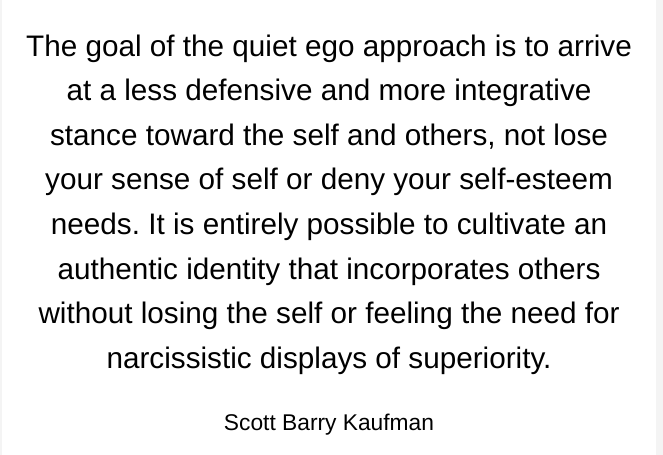Introduction
In today’s fast-paced, achievement-driven world, self-worth is often measured by external accomplishments, social media validation, and material success. Amidst this noise, the concept of the “quiet ego” emerges as a profound and countercultural paradigm. Rather than promoting dominance, competitiveness, or self-promotion, the quiet ego emphasizes humility, empathy, and personal growth. It offers a sustainable, evidence-based framework for psychological well-being—rooted not in ego inflation but in self-awareness and compassion for others.
Coined and developed by psychologists Heidi Wayment and Jack Bauer, the quiet ego presents a healthy model of self-esteem that moves beyond narcissism or self-negation. It encourages individuals to balance self-interest with concern for others, leading to a more resilient and grounded sense of identity.
Read More- Ways to Develop Mental Health
Understanding the Quiet Ego
Wayment and Bauer (2015) introduced the Quiet Ego Scale (QES) to measure this nuanced self-concept. The scale is based on four interrelated traits that together foster a healthy, compassionate identity:

1. Detached Awareness
Detached awareness refers to the ability to be present and mindful without clinging to ego-driven thoughts or judgments. It involves observing experiences with clarity and equanimity, reducing reactivity and fostering emotional resilience. This trait is cultivated through practices such as mindfulness meditation, which has been shown to improve well-being and reduce rumination (Keng, Smoski, & Robins, 2011).
2. Inclusive Identity
This trait emphasizes recognizing the common humanity shared with others. It broadens the boundaries of self to include empathy and collective identification. An inclusive identity promotes compassion, reduces prejudice, and encourages cooperation—qualities essential for interpersonal well-being and community building.
3. Perspective-Taking
The quiet ego values the ability to see the world through others’ eyes. Perspective-taking improves emotional intelligence and nurtures empathy, facilitating better conflict resolution and reducing egocentric thinking. This trait is associated with higher-quality relationships and emotional maturity (Davis et al., 1996).
4. Personal Growth
Unlike traditional ego traits focused on external validation, quiet ego individuals are driven by a desire for self-improvement, learning, and inner development. They view challenges as opportunities for growth, not as threats to self-worth. This growth mindset, popularized by Carol Dweck, is critical for resilience and long-term satisfaction.
Psychological Benefits of Cultivating a Quiet Ego
Research has shown that quiet ego characteristics are linked to a wide range of positive outcomes:
- Higher Psychological Well-Being- Individuals scoring high on the Quiet Ego Scale report greater life satisfaction, emotional stability, and a stronger sense of meaning and purpose (Wayment & Bauer, 2015).
- Lower Stress and Anxiety- By reducing self-centered rumination and encouraging mindfulness, the quiet ego helps individuals handle stress more effectively. A study by Wayment & Bauer (2022) found that participants who engaged in a quiet ego contemplation intervention experienced reduced stress levels and enhanced emotional intelligence.
- Greater Flourishing and Resilience- The quiet ego supports what positive psychologists refer to as flourishing—a combination of happiness, purpose, and social connectedness. It also promotes psychological resilience by fostering self-compassion and flexible thinking during setbacks (Fredrickson, 2004).
How to Nurture a Quiet Ego in Daily Life
Cultivating a quiet ego requires consistent, intentional practices that foster mindfulness, connection, and self-awareness. Below are several proven strategies:

1. Mindfulness Meditation
Mindfulness fosters detached awareness, helping individuals observe their thoughts and emotions without judgment. Regular meditation reduces egoic reactivity and builds emotional resilience (Kabat-Zinn, 2003).
2. Gratitude Practice
Gratitude enhances a quiet ego by shifting focus from what one lacks to appreciating the present moment and others. Keeping a gratitude journal or expressing appreciation regularly can significantly increase well-being.
3. Altruistic Behavior
Engaging in acts of kindness or volunteering helps develop an inclusive identity and reduces excessive self-focus. Altruism supports a sense of purpose and connection, essential traits of the quiet ego.
4. Perspective-Taking Exercises
Practicing empathy by actively imagining another person’s viewpoint enhances emotional intelligence and reduces bias. This can be integrated into daily interactions or guided reflection practices.
5. Self-Reflection and Journaling
Journaling about personal challenges and what one learns from them encourages a growth mindset. It helps quiet the ego by promoting self-compassion and introspective insight.
Quiet Ego vs. Big Ego
Mainstream culture often equates self-confidence with dominance, self-promotion, and relentless ambition. In contrast, the quiet ego offers a radically different path to self-esteem—one based on humility, empathy, and inner strength. While the “big ego” seeks to impress, the quiet ego seeks to connect and contribute.
Psychology Fanatic (2023) notes that the quiet ego challenges the modern obsession with branding the self and instead fosters sustainable mental health. Quiet ego individuals tend to have deeper relationships, lower levels of narcissism, and a greater capacity for long-term happiness.
Conclusion
The quiet ego represents a transformative approach to self-esteem—anchored in awareness, empathy, and growth rather than external validation. In a world that often rewards loudness and competition, the quiet ego invites us to turn inward, cultivate compassion, and nurture resilience. As research increasingly supports the psychological and social benefits of quieting the ego, it becomes clear that the path to a more meaningful, happy life may not lie in shouting to be heard, but in learning to listen—both to ourselves and to others.
References
Davis, M. H., Luce, C., & Kraus, S. J. (1996). The Heritability of Empathy: Evidence from a Twin Study. Journal of Personality and Social Psychology, 70(3), 505–517. https://doi.org/10.1037/0022-3514.70.3.505
Fredrickson, B. L. (2004). The broaden-and-build theory of positive emotions. Philosophical Transactions of the Royal Society B: Biological Sciences, 359(1449), 1367–1377. https://doi.org/10.1098/rstb.2004.1512
Kabat-Zinn, J. (2003). Mindfulness-Based Interventions in Context: Past, Present, and Future. Clinical Psychology: Science and Practice, 10(2), 144–156. https://doi.org/10.1093/clipsy.bpg016
Psychology Fanatic. (2023). Quiet Ego vs. Big Ego: The Path to Inner Strength and Lasting Happiness. Retrieved from https://www.psychologyfanatic.com/quiet-ego
Wayment, H. A., & Bauer, J. J. (2015). The Quiet Ego Scale: Measuring the Compassionate Self-Identity. Journal of Happiness Studies, 16(4), 999–1033. https://doi.org/10.1007/s10902-014-9546-z
Wayment, H. A., & Bauer, J. J. (2022). Quiet Ego Intervention Enhances Flourishing by Increasing Quiet Ego Characteristics and Trait Emotional Intelligence: A Randomized Experiment. Journal of Happiness Studies. https://doi.org/10.1007/s10902-022-00560-z
Subscribe to PsychUniverse
Get the latest updates and insights.
Join 3,036 other subscribers!
Niwlikar, B. A. (2025, May 10). The Quiet Ego: 5 Ways to Reclaiming Self-Esteem Through Compassion and Inner Strength. PsychUniverse. https://psychuniverse.com/the-quiet-ego/



